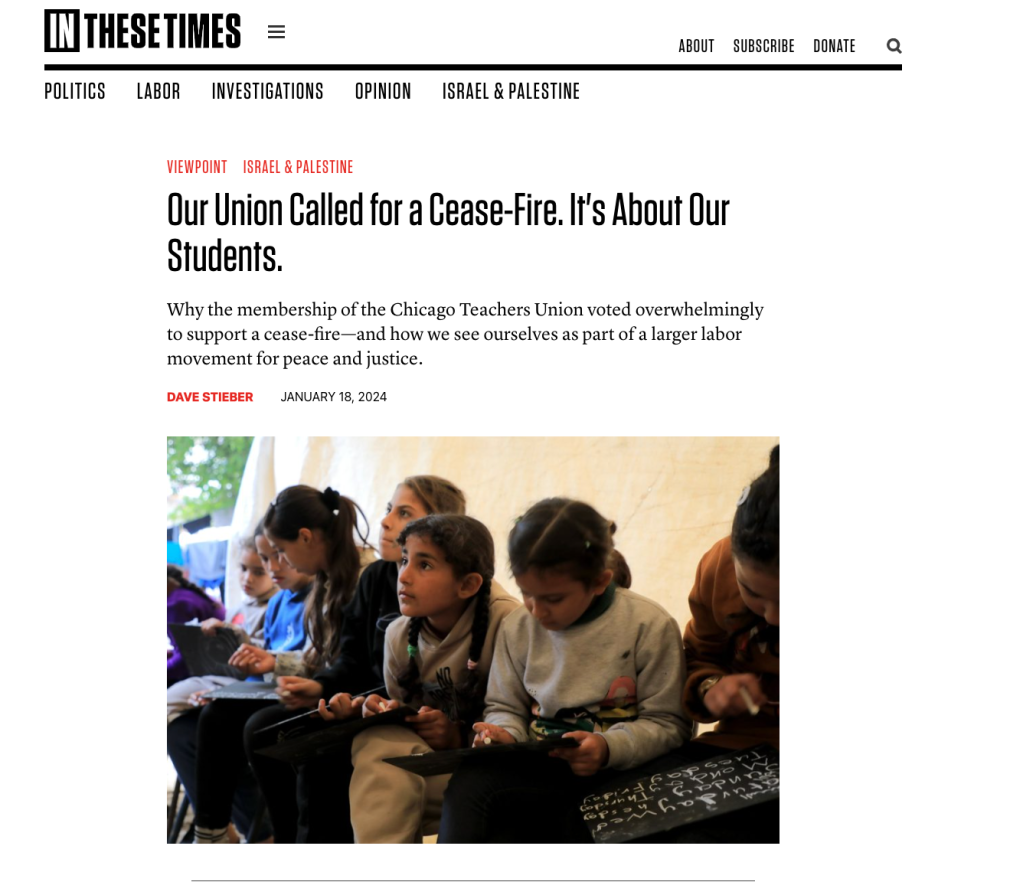
Why the membership of the Chicago Teachers Union voted overwhelmingly to support a cease-fire—and how we see ourselves as part of a larger labor movement for peace and justice.
DAVE STIEBER JANUARY 18, 2024
If you teach, your absolute worst nightmare is that something tragic happens to your students. Teachers don’t just think about students when they are in front of us; we think about them throughout each day and night. They are a central part of our lives.
When a young person steps into our classroom, the first thing we do is work to connect. That’s the best way students learn. When a student doesn’t live up to their own potential, we take it personally. We obsess about what went wrong.
Caring about students also means deliberately caring about the world we are helping them grow into. It has never been enough to only teach students when they are in the classroom; we have to advocate for them all the time.
For too many of us teachers, we have also had to wrestle with how to respond when something tragic happens to our students. And tragedy strikes at a devastatingly regular pace. Losing one student is unbearable; I’ve lost damn near a classroom over my 17 years, from intra-communal violence, police violence and tragic accidents. Thinking about and seeing the pain their families experience is soul-shattering.
Fundamentally, educators are really only in this profession because we care so deeply about young people and the promise they hold — not in our communities, but across the globe.
Watching what is happening in Gaza has been soul-shattering too. Some 10,000 children have been killed since October 7; many are now without parents; some have been held hostage. Every one of them is someone’s child, someone’s loved one, someone’s student.
I’ve been told directly that teachers need to stick to teaching, that international matters aren’t something we should talk about, and that educators don’t have any clue or right to comment on issues that may seem so far away.
But we know what it is like to lose students, to see young people suffer. Whether that child is in Chicago, Israel, Palestine or anywhere in the world, we don’t want anyone else to experience this pain. My partner encouraged me to finally start therapy because I lost so many students that I was no longer able to cope with seeing the empty desks, the social media eulogies, the funerals.
That’s why, for the first time in the history of the Chicago Teachers Union (CTU), we approved a resolution on November 1 to improve how we support students during world conflicts. That’s why we also approved another resolution, to add our name to a letter with other unions calling for an immediate cease-fire in Israel and Palestine. This decision wasn’t impulsive; our members met and thoroughly considered and discussed the various angles and issues. Our hundreds of delegates, all educators, further discussed and voted democratically. The support was nearly unanimous.
But I also need to note that, even though there was so much support, this decision wasn’t easy. Union leadership is in agreement with the resolution at its core, but it is naturally concerned about potential blowback — blowback we have seen come to so many people and organizations who have called for an end to the violence, blowback that our union has received because many on the Right are upset with what we’ve been able to achieve.
The son of our president, Stacy Davis Gates, has become a target, and her parents’ home is under police supervision because of threats. Jackson Potter, our vice president, who is Jewish, has received antisemitic threats.
There’s also concern about how the CTU might be looked at going forward. Would elected officials stop supporting us in Springfield? Would they no longer endorse legislation we put forward? We had these internal discussions and thought about our values. As Potter said at a rally in Chicago in November, organized in part by Jewish Voice for Peace and IfNotNow: “As a fighting union dedicated to the adherence of human rights, our most important representative body voted overwhelmingly in favor of a cease-fire to stop the senseless bloodshed of innocents and call for the return of all hostages.”
A big part of our motivation is that we know our students are watching the same videos and seeing the same news on TikTok and Instagram as we are. We can’t pretend like the issue is not affecting their lives, and we can’t pretend like youth in the United States don’t overwhelmingly want the violence to end. As always, our students are watching us and seeing if we will teach about what is happening. They know we’re not robots, and they wonder what our values are.
For me, too, it’s personal. My dad is a Vietnam combat veteran who was often emotionally unavailable growing up. Only after the Iraq War started, in 2003, did he meet and work with other veterans who were speaking out against wars; when my own kids were born, he finally started sharing more about his experiences. When my kids played, screamed or were loud, it took him back to a place he does not want to remember.
The killing of children and civilians, the bombing of cities, hospitals and schools, is not honorable. Death no matter where it takes place is unforgivable and destroys generations. A family doesn’t ever really come back from tragically losing a loved one.
This post was originally published on In These Times.